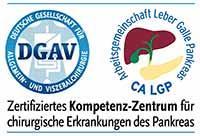Pseudomyxoma Peritonei — CRS and HIPEC - Hyperthermic Intraperitoneal Chemoperfusion: treatment in the Best Hospitals of Germany
Treatment prices are regulated by national law of the corresponding countries, but can also include additional hospital coefficients. In order to receive the individual cost calculation, please send us the request and medical records.

Department of General, Abdominal, Transplant, Hepatopancreatobiliary, Colorectal, Endocrine, Bariatric Surgery and Hernia Surgery
The Department of General, Abdominal, Transplant, Hepatopancreatobiliary, Colorectal, Endocrine, Bariatric Surgery and Hernia Surgery provides the full range of services in the areas of its specialization and holds a leading position at the national and international levels in terms of the number of surgical interventions performed and their success. Of particular interest are operations for treating diseases of the bowel, stomach, esophagus, pancreas, liver, gallbladder, and bile ducts, and endocrine glands. The department's doctors have excellent skills in the surgical treatment of cancer, surgery for liver, kidney, pancreas, and small intestine transplants, and operations for morbid obesity. The department's operating rooms are the pride of the medical facility, since they have all the necessary technical options for performing operations with the da Vinci surgical system, image-guided interventions, and endoscopic surgical procedures, which are characterized by minimal trauma rates.







Department of General and Abdominal Surgery, Hepatopancreatobiliary Surgery, Colorectal Surgery, Endocrine Surgery, Hernia Surgery and Bariatric Surgery
The Department of General and Abdominal Surgery, Hepatopancreatobiliary Surgery, Colorectal Surgery, Endocrine Surgery, Hernia Surgery and Bariatric Surgery offers the full range of effective surgical treatments in accordance with modern medical standards. Operations of varying complexity are performed on the stomach, colon, pancreas, liver, gallbladder, bile ducts, rectum, thyroid gland, and parathyroid glands in the department's operating rooms every day. The department's primary focus is the surgical treatment of malignant gastrointestinal tumors. The medical facility is certified in this area by the German Cancer Society (DKG). The team of endocrine surgeons specializes in the treatment of diseases of the thyroid gland, parathyroid glands, and adrenal glands. Patients with morbid obesity are also successfully operated on here. In their work, the department’s specialists primarily use minimally invasive surgical techniques, which virtually eliminate trauma to healthy tissue during the intervention. The department's operating suite is equipped with an innovative da Vinci Surgical System, which allows the doctors to perform sparing and high-precision surgical interventions. The specialists of the medical facility strictly adhere to hygiene and safety standards and create the most comfortable conditions for each patient during their hospital stays.







Department of General and Abdominal Surgery
According to the Focus magazine, the Department of General and Abdominal Surgery ranks among the top German departments specializing in bowel cancer treatment! The department offers the full range of classical and minimally invasive methods for the treatment of common surgical diseases, cancer pathologies, diseases of the endocrine organs, proctological problems. The specialization also covers transplant surgery (liver, kidney and pancreas transplantation). The department is certified by the German Cancer Society for its outstanding results in the treatment of bowel, pancreatic, stomach and liver cancers.






Pseudomyxoma peritonei is peritoneal carcinomatosis caused by a mucinous tumor. The initial localization and grade of cancer may vary. Pseudomyxoma peritonei may develop due to various diseases. The most common causes are ovarian, colon, and appendiceal cancers. The mainstay of treatment for peritoneal carcinomatosis and pseudomyxoma is cytoreductive surgery (CRS). In addition, hyperthermic intraperitoneal chemotherapy (HIPEC) is used in Germany to lower the risk of recurrence, increase patient survival rates, and reduce the general cost of cancer treatment.
Content
- What is CRS for pseudomyxoma peritonei?
- What is HIPEC therapy for pseudomyxoma peritonei?
- What is the process of pseudomyxoma peritonei treatment?
- Treatment in Germany with CRS-HIPEC for pseudomyxoma peritonei
What is CRS for pseudomyxoma peritonei?
Cytoreductive surgery is the main treatment method for pseudomyxoma peritonei. CRS can also be used for other types of peritoneal carcinomatosis.
The term cytoreductive surgery means that the goal of the operation, unlike radical surgery, is not to completely remove the tumor but to shrink the tumor size. At the same time, it is possible that small tumors and clusters of cancer cells may remain after the operation.
The CC score (Completeness of Cytoreduction Score) is used to assess the completeness of cytoreduction. The best results in treating pseudomyxoma peritonei can be achieved with CC-0. This is a complete cytoreduction, which means that the doctor can see no tumor with his eyes. If the remaining tumors are no larger than 2.5 mm, this is optimal cytoreduction. It is denoted as CC-1. This surgery also gives good results, but the risk of recurrence is much higher, and it occurs sooner. If cytoreductive surgery is performed in CC-2 volume (tumors up to 2.5 cm) or CC-3 volume (tumors larger than 2.5 cm), surgery should be considered unsuccessful. This is due to the fact that the results of such treatment do not significantly surpass those of systemic chemotherapy.
What is HIPEC therapy for pseudomyxoma peritonei?
Even in its standalone form, CRS for pseudomyxoma peritonei is highly effective, especially if cytoreductive surgery is performed to achieve complete cytoreduction. However, the additional use of hyperthermic intraperitoneal chemotherapy improves these results. After the CRS-HIPEC combination, the five-year survival rate of patients with pseudomyxoma peritonei reaches 85%.
After CRS, even if cytoreduction is complete, cancer cells inevitably persist in the abdominal cavity. They become the source of tumor recurrence. However, these cells can be destroyed using hyperthermic intraperitoneal chemotherapy. This procedure suggests rinsing the peritoneum with a heated solution of cytostatics. In the case of HIPEC, the concentration of drugs in the solution is 10-20 times higher than that achieved in the blood plasma. Consequently, the effect will be more rapid and stronger.
HIPEC achieves its effect through heating the solution. The term "hyperthermic" means that its temperature is higher than the temperature of the human body. Heating is required to enhance the cytostatic effect of the drugs. In addition, intraperitoneal chemotherapy in hyperthermic mode can improve the penetration of drugs deep into small tumor foci. When conducting HIPEC, drugs can penetrate up to 2-3 mm, depending on which cytostatics are used.
What is the process of pseudomyxoma peritonei treatment?
Treatment begins with surgery. It is performed through an abdominal incision. The doctor performs a revision of the abdominal cavity, after which he finds and removes all tumor foci. As a rule, he has to remove a significant part of the peritoneum, large omentum, spleen, and gallbladder. It may also be required to remove the pelvic peritoneum, uterus, ovaries, and a section of the sigmoid colon with mesentery.
The extent of the operation determines the location of the primary tumor and its spread through the peritoneum. For example, in mucinous ovarian cancer, the uterus and its appendages must be removed, and in the case of stomach cancer, this organ is also removed. Some patients require resection of the pancreas, diaphragm, bladder, ureter, and other organs.
In the final stage of treatment, four drainage tubes are placed in the abdominal cavity for hyperthermic intraperitoneal chemotherapy. Cisplatin, less frequently mitomycin, taxanes, or doxorubicin, are diluted in 3-5 liters of saline solution. The temperature of the solution is, on average, 43 degrees. Perfusion then begins. The solution with cytostatics is administered into the peritoneal cavity during HIPEC therapy through the drainage system and then removed from it. Perfusion continues for 1-2 hours.
Treatment in Germany with CRS-HIPEC for pseudomyxoma peritonei
You are welcome to use the Booking Health services to undergo treatment in Germany using the CRS and intraperitoneal chemotherapy (HIPEC). On our website, you can find the best hospitals in Germany and see the direct prices offered by hospitals. You can compare the cost of services in different medical facilities, sort hospitals by price, and choose the most cost-effective option for your treatment in Germany.
The total cost of treatment consists of the cost of two treatment methods: surgery and intraperitoneal chemotherapy. However, they are actually two stages of the same procedure, as intraperitoneal chemotherapy (HIPEC) is performed at the final stage of the surgery. Although the additional use of HIPEC increases the cost of treatment compared to surgery alone, the price increase is well worth it because cancer treatment will be more effective. The cost of CRS and hyperthermic intraperitoneal chemotherapy (HIPEC) for pseudomyxoma peritonei is between 52,320 EUR and 92,300 EUR.
If you make an appointment for your treatment in Germany through the Booking Health service, the prices for you will be lower than usual. The cost of services in Germany is reduced due to the absence of additional fees for foreign patients. Additionally, you save on organizational services as the Booking Health specialists provide them at a lower price than international departments of German hospitals.
When using the Booking Health service, you can be sure that the price of CRS-HIPEC treatment will not change, even if additional procedures are required. Their cost will be covered by insurance.
Authors:
The article was edited by medical experts, board-certified doctors Dr. Vadim Zhiliuk and Dr. Nadezhda Ivanisova. For the treatment of the conditions referred to in the article, you must consult a doctor; the information in the article is not intended for self-medication!
Sources:

